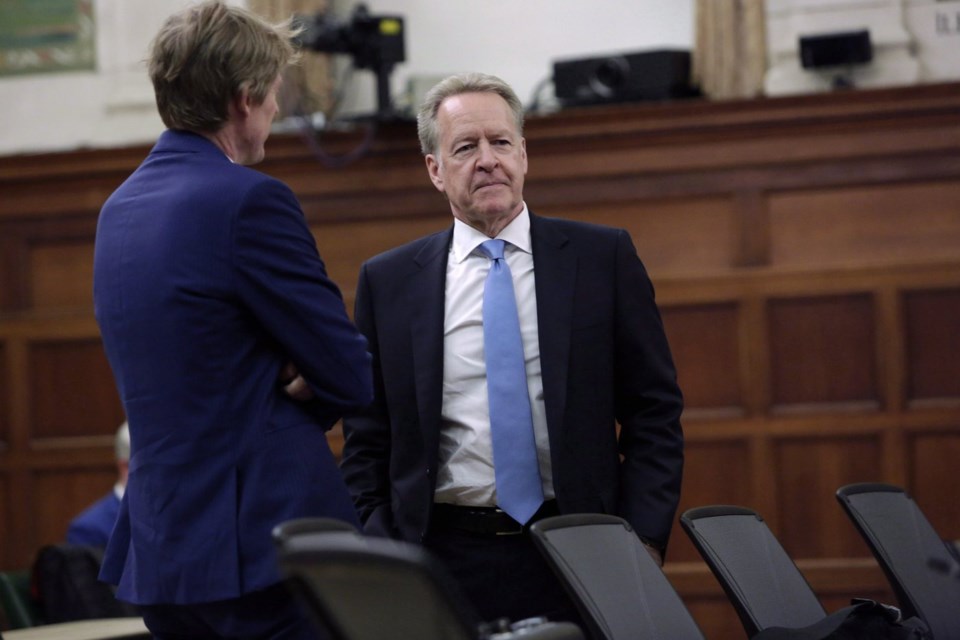OTTAWA — Ottawa's former chief trade negotiator Steve Verheul says Alberta is undermining Canada's attempts to prevent the U.S. from levying damaging tariffs — a measure U.S. President Donald Trump has said could drive Canada into "failed state" status.
Prime Minister Justin Trudeau has rallied most of the premiers to agree that all sectors of the Canadian economy could be deployed to fight back against Trump's plan to impose 25 per cent tariffs on all imports from Canada.
Alberta Premier Danielle Smith disagrees. She has said that Canada should not threaten the U.S. with retaliatory tariffs or cutting off energy exports, and should focus instead on finding common ground.
Earlier this week, Verheul attributed Canada's successful renegotiation of NAFTA during Trump's first presidency — which culminated in the Canada-United States-Mexico Agreement (CUSMA) — in part to the coherent message coming from the provinces, industry and Ottawa.
"When they all briefed up, the messages were the same and it was much easier to do it that way," he told the Toronto-based Empire Club on Tuesday.
"There is a very strong sense of unity among all of the premiers at this point — with the one exception of Alberta."
Verheul said that Canada's leaders must try to get Alberta's government "on board too. Because the fact that Alberta has gone in a different direction through these last few weeks has significantly undermined Canada's position."
For now, Canada is in "damage control" mode, he said.
Smith's office said Friday that Trudeau and the premiers are shifting their messaging after Wednesday's virtual meeting to focus more on collaboration with the U.S. to meet the goals outlined by Trump on energy and border security.
"Thankfully, we've all agreed to take a new approach," said part of a media statement from Smith's office - which later clarified the message.
"Thankfully, a consensus is emerging to take a new approach and to prioritize the things that unite us – rather than divide us," said the updated message.
“From the beginning, there was a consensus among first ministers not to negotiate this in public."
On Wednesday, a day after Verheul's remarks and as the premiers met virtually with Trudeau, two other premiers pushed back on the federal position on tariffs.
Saskatchewan Premier Scott Moe said Wednesday he had "an issue with" putting tariffs on energy exports. That same day, Quebec Premier François Legault suggested such measures should be deployed only with the provinces' consent.
On Friday, Trump again said that Canada should become an American state, adding "it's sort of crazy" to suggest the U.S. needs Canadian imports.
Trump said he told Trudeau earlier that the U.S. is subsidizing Canada to the tune of billions of dollars, and claimed Trudeau said that if those subsidies stopped, Canada would be "a failed nation."
The president insisted Canada would have "better health coverage" and "wouldn't have to worry about military" as an American state, adding that Canada has been "very nasty to us on trade."
Experts have said that Canada's trade imbalance with the U.S. largely stems from Canada's energy exports. They also say it's wrong to think of this as a subsidy — particularly as Trump offers wildly diverging estimates of its size.
Asked about Trump's remarks, Defence Minister Bill Blair said his "unfortunate rhetoric" is "offensive to us" and "Canada will never be a failed state."
Liberal leadership contestant Chrystia Freeland, who helped steer the NAFTA renegotiations, said Canada would "absolutely not" become a failed state if Trump's threatened tariffs take effect.
Verheul told the Empire Club that the current situation with the tariff threat is much different than the NAFTA renegotiation, when Canada was "better prepared than the U.S. was, and got a reasonably good deal." This time, he said, the U.S. has "a zero-sum" approach.
"If we don't retaliate, we'll just keep paying and paying concessions — and we'll never know where the end point is," he said.
"I think we're going to have to go through this whole process of retaliation and counter-retaliation, before we can move toward some kind of more normal negotiation."
He said the "real underlying reason" for these tariffs is likely to get companies to relocate to the U.S. "That's the toughest part we have to address," Verheul said.
RBC chief economist Frances Donald told the Empire Club that Trump's promised tariffs would cause a three-year recession in Canada and push many to get trained for new jobs. She said the manufacturing sector is particularly exposed.
"This is not a transitory shock," she said. "A 25 per cent across-the-board tariff is one of the most prolonged, problematic recessions that Canada has experienced."
She said that Ottawa likely would need to provide benefits similar to those it offered during the COVID-19 pandemic, but would also need to spend to "help people reposition and retrain for their next evolution coming forward."
Donald said Canada has leverage over the U.S. because it provides a quarter of its energy, a large share of agriculture and minerals that are critical to the defence sector.
She said Canada is doing well in the bond markets but has structural issues that would make a tariff war hurt a lot more here than in other countries, causing economic damage that would take five to 10 years to fix.
Fixing those issues means enacting policies economists have sought for decades, such as simplifying tax codes, cutting interprovincial trade barriers, improving productivity and focusing on new technologies in such sectors as nuclear energy and artificial intelligence.
"The Canadian dollar will be persistently weaker than where it was 10 years ago," Donald said.
She said the value of the Canadian dollar likely will range from $1.35 to $1.45 for each U.S. dollar, which will "offset some of the impact of the tariff shock" by buffering some of the rising costs for Americans, thus avoiding a crash in demand.
— With files from Kyle Duggan
This report by The Canadian Press was first published Jan. 24, 2025.
Dylan Robertson, The Canadian Press



